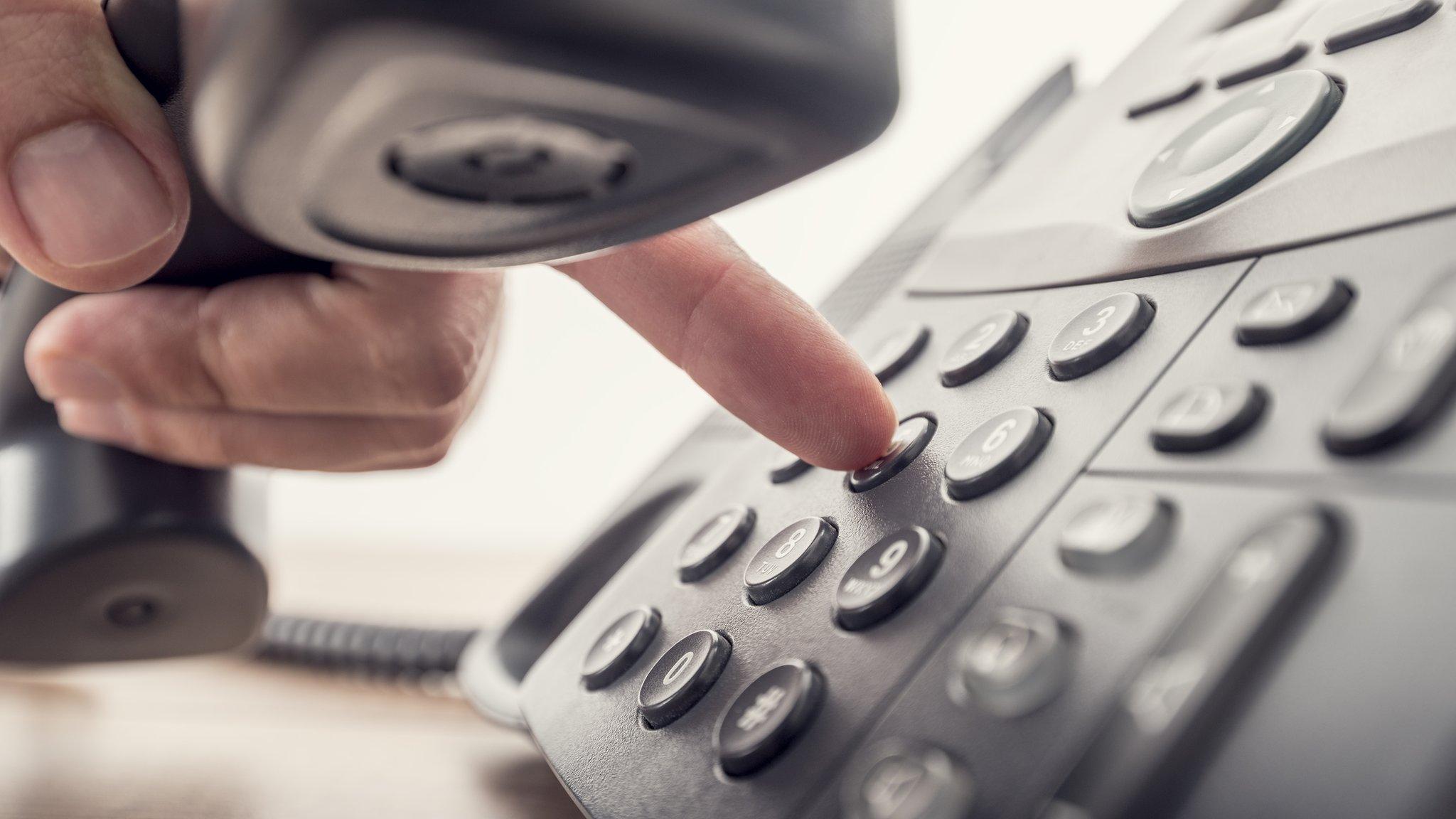Nuisance calls: Five things you wanted to know
- Published

A growing number of scam callers use "spoofing" to hide their true number
The UK's information watchdog receives a complaint about nuisance phone calls on average every five minutes. We answer your questions on how the calls get through and what can be done about them.
How do nuisance callers make it look as if they are calling from a number they are not using?
Caller ID is a common facility on phones to let you see who is ringing you. However, a growing number of nuisance callers and criminals are changing their caller ID to a different number, which is known as "spoofing".
Communications regulator Ofcom says there can be good reasons for this, such as leaving an 0800 number you can call back for free.
However, scam callers will do it in order to disguise themselves and make it less easy to trace them.
The most common way they do it is through voice over internet protocol (VoIP), which allows calls to be sent over a web connection, rather than via a phone line. Some VoIP providers let users choose the number they display.
What do I do about it?

Scammers can disguise their telephone numbers over a web connection
Ofcom's advice is never to give out your personal information when answering an incoming call and do not rely on the Caller ID as a means of identification.
This is also the case when answering a call from a company you think you should be able to trust, such as your bank.
Ofcom advises you instead "hang up and call the phone number on your (bank) account statement" or use the number on the company's website. You should also wait at least five minutes after hanging up to call. This makes sure the line has cleared and you are not still talking to a potential fraudster.
If you think you have been a targeted by scammers call Action Fraud, external on 0300 123 2040.
For more stories from the BBC England Data Unit follow our Pinterest board, external
Why does registering with the Telephone Preference Service make little difference?
The Telephone Preference Service (TPS) allows you to opt out of receiving sales and marketing phone calls.
Marketing calls are legal and are regulated.
Genuine companies who want to try to sell you something are obliged to leave you alone if you are registered with the TPS. If they continue you can complain about this and get them stopped.
The problem for many people who receive nuisance calls is that these may be being made fraudulently.
On its website the TPS explains: "Scam calls or calls of a fraudulent nature are outside the remit of TPS. Registration does not stop scam calls and the TPS complaints team does not have authority to investigate scam calls i.e. calls claiming that a computer has a virus and offering remote technical support. Please report such calls to Citizens Advice Consumer Service (CACS) on 03454 040506 or by e-mail to their contact form, external."
Scam callers do get tackled, however. Action Fraud, the UK's national fraud and cyber crime reporting centre, shuts down 80,000 rogue phone lines a year.
How are overseas callers dealt with?
If an overseas call centre is ringing on behalf of a UK-based company, then they too must leave you alone if you register with the TPS.
The problem with overseas scam calls is that they are outside the jurisdiction of UK authorities.
To stop them, consumer group Which?, external recommends you consider asking your phone operator to block calls from international numbers. However, this will not stop those who spoof their numbers to appear as though they are in the UK.
You may want to invest in a call blocker, with various options at different prices available.
What happens if I do as they ask and respond?

Readers had some suggestions of their own for handling nuisance calls
Do not give them any information about yourself. If you do, then at the very least you can expect them to call again.
If you give a scammer personal details it could be used to steal your identity.
If you think you have been duped into giving your details then you should tell your bank or credit card provider so they can monitor your account for suspicious transactions.
If you have given other details, such as email addresses or other online accounts, then change your passwords.
No genuine caller should ever ask you for a password or PIN.
The best thing you can do with nuisance calls is to hang up.
Although some of the readers contacting the BBC via Your Questions had a few suggestions.
Ivor Rackham from Morpeth, Northumberland, said: "I keep fraudsters hanging on the phone for as long as possible, feeding them fake information. Twenty-three minutes is my record."
Cynthia Farrell wrote: "Keep a whistle by the phone and when you get a nuisance call, blow it loudly. They'll soon get the message."
- Published10 January 2017

- Published16 January 2017
